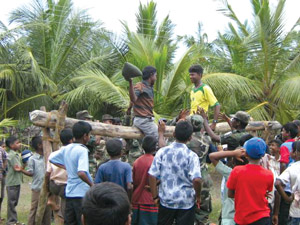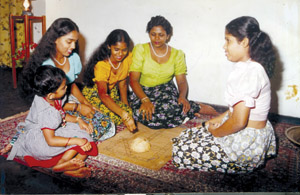Have fun with traditional games
The cuckoo birdís cry and the fragrance of the erabadu flowers which
have blossomed in abundance signify the joy of the festive season. The
much awaited day has finally arrived even though the auspicious time for
the event proper is yet to dawn...
 Most of you may wonder if Iím crazy if I said itís avurudu time!
Because long before anyone else could even think about it, you would
have been anxiously counting the days for the dawn of the joyous day -
April 13. It seems as if the Sinhala and Hindu New Year has come early
this year. Most of you may wonder if Iím crazy if I said itís avurudu time!
Because long before anyone else could even think about it, you would
have been anxiously counting the days for the dawn of the joyous day -
April 13. It seems as if the Sinhala and Hindu New Year has come early
this year.
It is indeed a fun-filled time for everyone, especially children, so
all or you must be really excited planning to have a great time not only
tasting the yummy sweetmeats (which you have been compelled to only look
at all this time) but also playing with friends, especially the
traditional games.
But even though itís a holiday and you cannot play until after the
New Year dawns, letís look into some of the traditional Ďavurudu gamesí
not only children but even some adults indulge in during this time.
What are the games you are planning to play this year? Let me tell
you about some of the traditional avurudu games you could play because
it is certainly not the time to play cricket or football. During avurudu
there are special games such as pancha keliya, onchili pedeema, kalagedi
sellama, olinda keliya and porapol geheema. These games will help you to
have fun and at the same time acquire team skills.
Oththe-iratte is believed to be one of the oldest games played during
the New Year. Games such as kawadi are played for stakes by both men and
women. The scoring by means of runners is done on a chart drawn up on a
plank or on cardboard.
Pancha is another popular indoor game played during the new year
season. Pancha is played with five small sea shells, a coconut shell and
a chart. Players are divided into two groups.
The traditional competitive games like climbing the greased pole,
pillow fighting (Kotta Pora), raban contests, gudu and elle are also
played in many people and at special events organised during the festive
season.
 Parasol gaheema is a contest between two teams, each taking turns to
throw a coconut until all the nuts on one side are broken. The winning
nut will be kept in the temple. This game is very famous in the southern
area, especially in Matara and Devundara. During ancient times, only
king coconuts were used, but nowadays coconuts are used. It is believed
that the origin of this game goes beyond the advent of Buddhism. Parasol gaheema is a contest between two teams, each taking turns to
throw a coconut until all the nuts on one side are broken. The winning
nut will be kept in the temple. This game is very famous in the southern
area, especially in Matara and Devundara. During ancient times, only
king coconuts were used, but nowadays coconuts are used. It is believed
that the origin of this game goes beyond the advent of Buddhism.
Ankeliya is another common game preferred by teenage boys. It is a
more elaborate exercise than porapol gaheema and is essentially a
community game where divisions called udupila and yatipila are made.
Each contesting side has a forked sambur horn.
These horns are interlocked and attached to a strong tree which is
called the an-gaha (horn tree). A rope is then attached to the
interlocked horns and both teams have to tug vigorously at the rope. The
tugging has to continue until one of the horns gets damaged.
Gudu Keliya is another game played mostly by the smaller children. A
propelling stick about two and a half feet long and a smaller one about
six inches in length called the kuttiya are used. A small hole about
three inches is dug on the ground.
Across this hole the kuttiya is placed. The player then inserts the
longer stick beneath the kuttiya and pushes it forward as fast as he/she
can.
The rival players are spread out in the field in order to catch the
kuttiya while it is still in the air. If any of them succeed, the
striker is out.
Another famous fun activity done during the season is going on the
swing or onchili padeema. Adults prepare gaily decorated swings on the
branches of overhanging trees for the children. They sing onchili waran
while they swing.
Tug-o-war is another game played especially at Avurudu Ulelas. This
is played using a long and strong rope. Players divide into two groups
to play this.
The middle of the rope is marked and each team is asked to stand on
either side of the rope and pull it until one team gets dragged towards
the opposite side.
Olinda Keliya is another popular game played especially in villages
during the season. This game is played using Olinda seeds. Itís mainly
played by women. Players also sing Olinda kavi.
Itís believed that Olinda keliya originated in Bangladesh. The stool
which is used to play Olinda has two columns with seven holes in a row.
Seeds like madatiya, mee and kakuna are also used to play this game.
These traditional games are really interesting to play. Most of them
are related to the religion. They enhance the team spirit of people and
also help make friends. Avurudu is the time to forgive and forget. It is
the time to make friends. Make use of these traditional games to foster
peace and harmony among everyone in your village and neighbourhood.
Have great fun playing games!
- Janani Amarasekera
|
